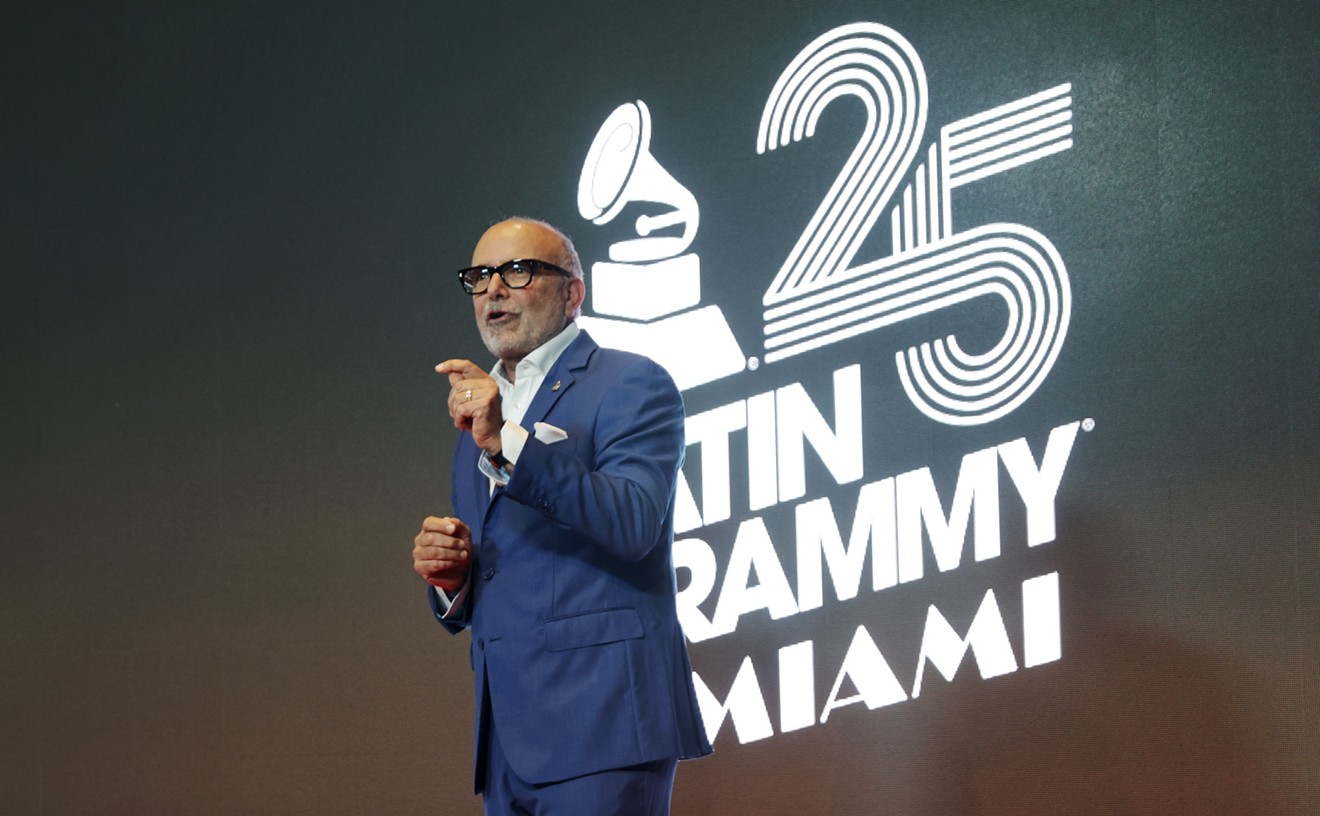You can find signs of his legacy in hip-hop political action groups such as Russell Simmons's Hip-Hop Summit Action Network in New York and Luke Campbell's Movement Tour here in Miami-Dade County. These campaigns are being managed by leaders who grew up during the Reagan administration and remember how he became, for better or worse, part of pop culture's iconography.
Like New York's five boroughs and Sylvester Stallone, Reagan was occasionally referenced on early hip-hop records. "Reagan is the prez but I voted for Shirley Chisholm," rapped Biz Markie on "Nobody Beats the Biz." But it was just name-dropping on a party track; there was little talk on early rap records of how the president ignored the growing AIDS crisis, for example, or failed to support federal civil-rights laws.
By the end of the Eighties, hip-hop music had developed beyond braggadocio. Still Ice Cube's "A Bird in the Hand," which criticized the war on drugs by arguing "a bird in the hand is worth more than a Bush," was the exception -- along with a handful of other tracks such as Eric B. and Rakim's "Casualties of War," a rare anti-Gulf War anthem, and Paris's self-explanatory "Bush Killa" -- in addressing then-President George H.W. Bush's policies.
For years, most hip-hop artists were more concerned with social and economic issues than with national politics. The first Bush administration was just another "government" or "devil" trying to keep the black man down. Instead the artists focused their analyses on sundry community problems such as police brutality and black-on-black crime; the remedy was self-empowerment through entrepreneurism rather than voting someone out of office. On Public Enemy's last great single, "Shut 'Em Down," Chuck D. noted, "I like Nike, but wait a minute/The neighborhood supports so put some money in it."
In the Nineties, during the Clinton administration, the act of voting for an elected representative was not only disregarded, but frowned upon. "You black people still thinking about voting/Every president we ever had lied," claimed KRS-One on "Ah Yeah." His reasoning, shared by other progressive artists such as Q-Tip from A Tribe Called Quest, was that it was more realistic to focus on one's own community than to try to change a seemingly remote government.
Of course, the president's policies don't just affect macro issues such as foreign relations and trade. Surprisingly it has taken years for the hip-hop generation to realize that Clinton's dismantling of the welfare system in 1996 was a culmination of Reagan's demonizing of black women as "welfare mothers" who spawned "crack babies" back in the Eighties; or that the Federal Communications Commission (whose five members are appointed by the president) is censoring free speech in a way that resembles Clinton's attacks on Sistah Souljah back in 1992, and Al and Tipper Gore's Senate hearings on profane lyrics in pop music in 1985.
Part of this evolution in thinking has to do with maturity. Twenty-six years after "Rapper's Delight" and the Reagan revolution, many MCs are in their thirties and forties, with families to feed and mortgages to pay. Living in an alternative, underground society ruled by the code of the streets is a dream of the past; now they're wondering why, in spite of their millions, they still find themselves being surveilled by police and demonized by politicians. Maybe that's why artists such as OutKast, who have picked up the mantle of genre-blending from the late Ray Charles (who passed away on Thursday, June 10), are calling themselves "too democratic, republic fuck it," if only to clarify which side of the white picket fence they stand on. It's part of this generation's evolution from fighting the system, and even trying to live outside of it, to learning how to work within and possibly subvert it.
Meanwhile HSAN and the Movement Tour are relying on famous rappers to encourage young people to register to vote. During a rally at Florida Memorial College last March co-hosted by Campbell and state Rep. James "Hank" Harper, Jr., Jacki-O, Trick Daddy, and JT Money showed up to lend their support. The Detroit Hip-Hop Summit, one of several summits Simmons has put together over the past year, was hosted by Eminem and featured appearances by D-12, Run from Run-DMC, and the Ying Yang Twins. With star power like that, who wouldn't be convinced?
According to the U.S. census, only 45.4 percent of people between the ages of 18-24 were registered prior to the 2000 November elections, and only 32.3 percent actually voted. (This was compared to 63.9 registered voters among all Americans over the age of eighteen, of whom 54.7 percent voted.) To date, neither HSAN nor the Movement Tour has announced plans to "get out the vote" in the fall, which would be necessary to convert the young hip-hop fans who flocked to the rap concerts/political rallies into a real power base. Now, the question is: Will those fans actually go to the polls come November?










